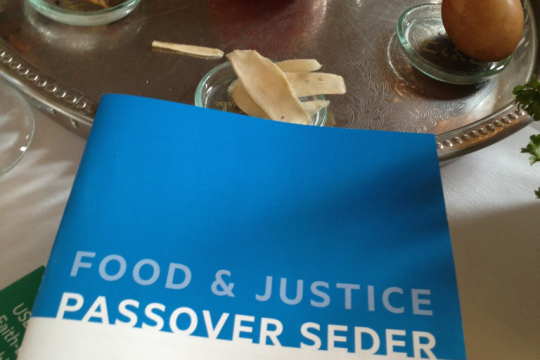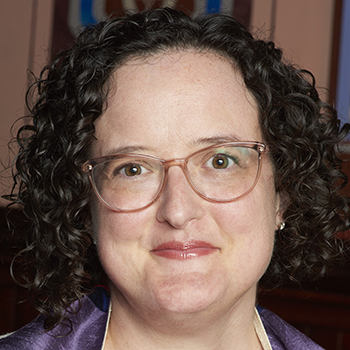
Summer has a way of inviting us to unplug from the world. The long, languid days of August beckon us to find a place in the shade with a good book, or a body of water to float in. For many of us, emails slow down; homework is on hiatus. It's too hot to do anything, so for once we give in and allow ourselves the chance to just be. But then comes Tishah B'Av (the 9th day of the Hebrew month of Av), a traditional Jewish day of mourning and reflection. On this day, we commemorate the many tragic and calamitous events in our past, including the fall of the first and second Temples in Jerusalem in 586 B.C.E and 70 C.E. Suddenly, we find ourselves sitting on the hard floor, hearing the haunting melody of Lamentations, and coming face to face with the memory of societal collapse and heartbreak.
But if the High Holy Days urge us to make amends, and Passover compels us to seek freedom, what does Tishah B'Av demand of us, other than forced sorrow in the midst of summer's bounty? For thousands of years, we have grappled with this question by contemplating how the Second Temple came to be destroyed.
The Babylonian Talmud offers several answers, all related to human behavior. In Yoma9b, we read: "Why was the Second Temple destroyed? Because there was baseless hatred during that time." In Shabbat 119b, one rabbi posits that "Jerusalem was destroyed only because the people did not rebuke one another." But the Talmud's most famous answer comes in the form of the enigmatic story of Kamtza and Bar Kamtza in Gittin 55b-56a:
There once was a man who decided to throw a lavish feast and invited a friend named Kamtza. His servant instead invited a man named Bar Kamtza, who was the host's enemy. The host came upon his enemy sitting at the feast and told him to get out. Bar Kamtza pleaded with the host not to humiliate him, offering first to pay half the cost of the banquet and then offering to pay for the full feast, but the host wouldn't relent and tossed him out.
Bar Kamtza said to himself, "The Sages were all present when this happened, and yet they said nothing, so apparently they approved!" He decided to go to the emperor and claim that the Jews were rebelling. As a test, the emperor sent an animal to be sacrificed at the Temple. But before it was offered, Bar Kamtza made a small blemish on its face which would render it unsuitable for sacrifice.
Some of the Sages suggested sacrificing it to appease the government, but Zechariah ben Avkolas objected, saying "If we do that, people will think it's acceptable to sacrifice blemished animals!" The Sages suggest killing Bar Kamtza so that he could not report back to the government. Again, Zechariah objected, saying "People will think offering a blemished animal is punishable by death!" So, the Sages did nothing. Bar Kamtza reported to the emperor that his sacrifice had been rejected, and the authorities attacked, resulting in the loss of the Temple.
Rabbi Yochanan (who led the community after the Temple's destruction) concluded, "Rabbi Zecharia's wimpiness destroyed our Temple, burned our Sanctuary, and exiled us from our land. (The traditional translation describes Yochanan's "excessive humility," but Rabbi Benay Lappe's suggestion of "wimpiness" captures Yochanan's sense of moral indictment).
A common understanding of this story is that the Temple was destroyed because of the dinner host's lack of hospitality or compassion. While the dinner did set events in motion, the Talmud does not assign blame to the host. Nor does one get the sense that Bar Kamtza is wholly at fault. Instead, the fault lies with the Sages, who sat still and did nothing while disaster loomed.
On "The Oral Talmud Podcast," Rabbi Lappe suggests that stories like this are designed to explain not only what once happened, but what always happens in society. "What if this story is not about how Jerusalem was destroyed," she asks, "but about how every system is destroyed?" If so, these are the lessons Tishah B'Av calls us to learn when facing our fractious and fragile world:
- Recognize and root out baseless hatred.
- Do not be a bystander.
- Address conflict and discomfort directly.
We live in times of algorithmically accelerated hate. It is easy to fan the flames of rage, and hard to stand in harm's way. Yet, Tishah B'Av teaches us - at the very time of year when we are most prone to disconnecting from the world's demands - that inaction is not an option.
The lesson of Bar Kamtza is not that we should brush conflict under the rug and embrace our enemies at all costs. Instead, the Talmud insists that the Temple fell because we could not constructively rebuke one another. Rather than stand up to Rabbi Zechariah's feckless hand-waving and catastrophizing, the Sages decided it was easier to do nothing. That was our downfall.
Today, our world feels like it hangs in the balance. But even as divisions within the Jewish community about Zionism, antisemitism, and democracy threaten to paralyze us, Tishah B'Av shakes us out of our complacency. It urges us to stop doom-scrolling and start speaking up. Don't know how to start? Do you feel out of practice having thoughtful, respectful disagreements? Check out the URJ's Talk for a Change campaign. These resources can help set ground rules that keep us around the table and open new avenues of understanding without demanding we sacrifice our integrity.
The message of this holiday is not that we should be pushovers or leave hateful behavior unaddressed. Rather, the message is that we cannot afford to opt out and assume society will stand without us. So, enjoy your beach reading...and then go have a tough conversation that will save the world.
Related Posts

Judging Others, Judging Ourselves

Empowering Camp Staff and Counselors to Address Difficult Questions about Israel and Beyond

